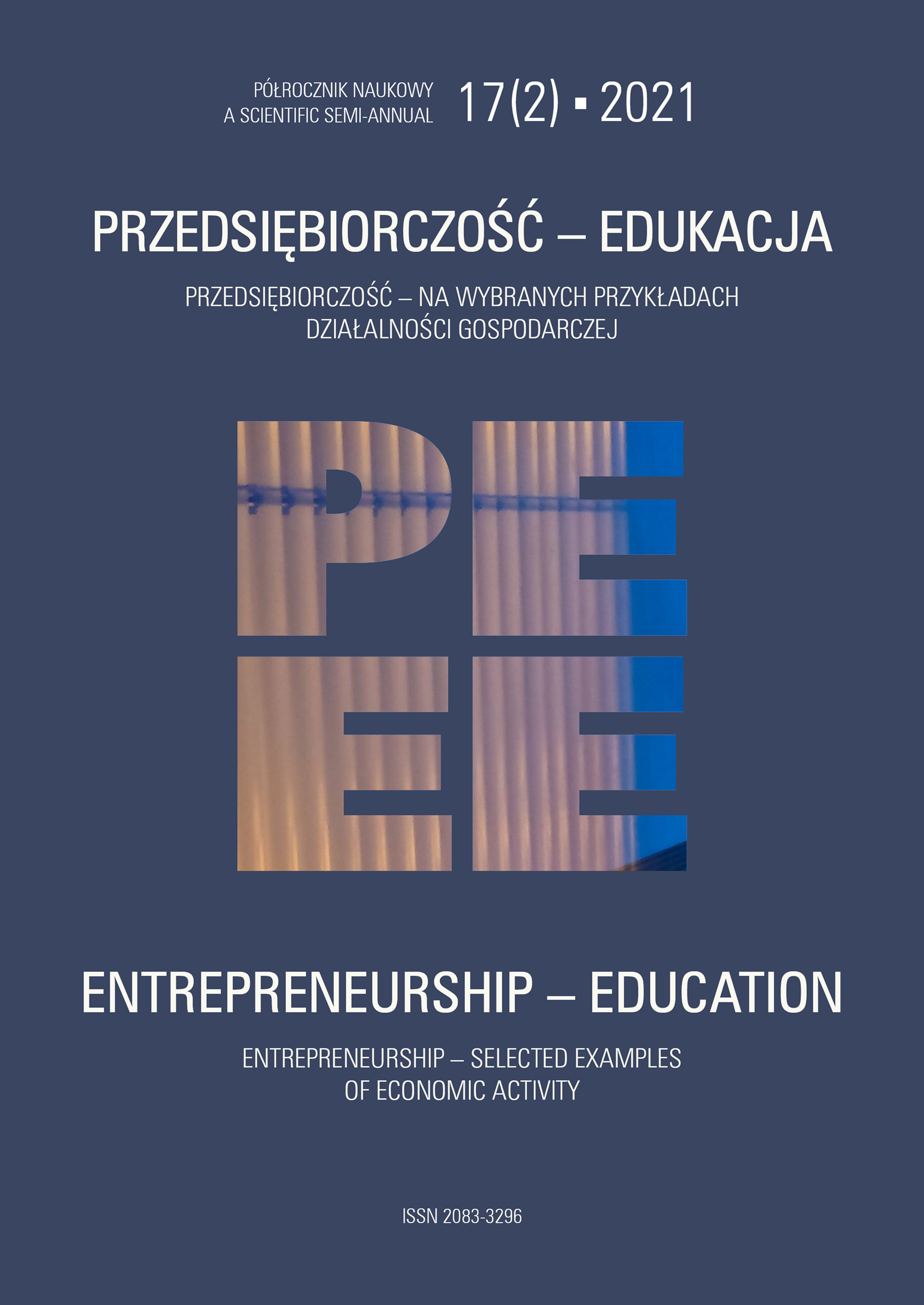Transformacja cyfrowa przedsiębiorczego uniwersytetu
DOI:
https://doi.org/10.24917/20833296.172.11Słowa kluczowe:
HEI, potencjał technologiczny, przedsiębiorczy uniwersytet, technologiczny wymiar, transformacja cyfrowaAbstrakt
Transformacja cyfrowa zmieniła radykalnie sposób działania wszystkich instytucji i organizacji, w tym uniwersytetów, w zakresie komunikacji i zasad ich funkcjonowania. W koncepcji przedsiębiorczego uniwersytetu wymiar transformacji cyfrowej i potencjału technologicznego stanowi ważne kryterium kształtowania mikroekosystemu przedsiębiorczości. Instytucje szkolnictwa wyższego (HEI) stosują technologie cyfrowe, jednakże stopień wykorzystania i integracji technologii w instytucjach, a nawet jednostkach w obrębie jednej instytucji, jest zróżnicowany. Podczas powodu zagrożenia zewnętrznego (epidemicznego) cyfrowe platformy edukacyjne umożliwiły prowadzenie zajęć i studiowanie w nowej, bezpiecznej i całkowicie zdalnej formule. W przyszłości posiadany i rozwijany potencjał technologiczny będzie wpływać na formację nowej generacji - poprzez tzw. inteligentny uniwersytet (smart university) - docelowo uniwersytet w chmurze (university in the cloud). Przedmiotem artykułu jest ocena przedsiębiorczego uniwersytetu (Uniwersytetu Ekonomicznego w Krakowie) w wymiarze technologicznym (zarówno transformacji cyfrowej, potencjału technologicznego, jak i informatycznych technik nauczania). Podstawą ewaluacji są wyniki badań ilościowych przeprowadzonych za pomocą narzędzia samooceny (ankiety HEInnovate) oraz badań jakościowych przeprowadzonych w formie ankiet z otwartymi pytaniami w 2019 i 2020 r. Rezultaty badań wskazują na dobrą ocenę przedsiębiorczości uniwersytetu i jego potencjału w badanym wymiarze.
Bibliografia
Andrews, D., Nicoletti, G., Timiliotis, Ch. (2018). Digital technology diffusion: A matter of capabilities, incentives or both?. OECD Economics Department Working Papers, 1476.
Barnett, R., Jackson, N. (2019). Ecologies for Learning and Practice: Emerging Ideas, Sightings, and Possibilities, Routledge.
Carayannis, E.G., Barth, T.D., Campbell, D.F. (2012). The Quintuple Helix innovation model: global warming as a challenge and driver for innovation. Journal of Innovation and Entrepreneurship, 1, 2 https://doi.org/10.1186/2192-5372-1-2
Christensen, C.M., Eyring, H.J. (2011). The Innovative University: Changing the DNA of Higher Education, John Wiley & Sons.
Czaja, I., Kafel, T. (2020). Pomiar wdrażania koncepcji przedsiębiorczego uniwersytetu. Przedsiębiorczość – Edukacja [Entrepreneurship – Education], 16(1), 144–158. https://doi.org/10.24917/20833296.161.12
Czaja, I., Kafel, T. (2019). Implementation of the entrepreneurial university concept at the Cracow University of Economics. In: A. Ujwary-Gil, N. Potoczek (eds), Organizations in the Face of Growing Competition in the Market. Warsaw: Institute of Economics, Polish Academy of Sciences, 17–34.
Etzkowitz, H., Leydesdorff, L. (1999). The Future Location of Research and Technology Transfer. The Journal of Technology Transfer, 24(2–3), 111–123.
Gibb, A., Haskins, G., Hannon, P., Robertson, I. (2009). Leading the Entrepreneurial University. Meeting the entrepreneurial development needs of high er education institutions. Retrieved from: https://core.ac.uk/download/pdf/288287534.pdf
Gueye, M., Exposito, E. (2020). University 4.0: The Industry 4.0 paradigm applied to Education. IX Congreso Nacional de Tecnologías en la Educación, Puebla (Mexico), France.
HEInnovate. (2018). The Entrepreneurial and Innovative Higher Education Institution. A Review of the Concept and Its Revelance Today. Retrieved from: https://heinnovate.eu/sites/default/files/heinnovate_concept_note.pdf
Hakak, S., Gilkar, G.A., Guslendra, Ritonga, R., Herawan, T. (2018). Future Private Cloud Architecture for Universities. In: V. Bhateja, B. Nguyen, N. Nguyen, S. Satapathy, Le DN. (eds), Information Systems Design and Intelligent Applications. Advances in Intelligent Systems and Computing, vol 672. Springer, Singapore. https://doi.org/10.1007/978-981-10-7512-4_71
Hytti, U., Blackburn, R., Laveren, E. (2018). Entrepreneurship, Innovation and Education. Frontiers in European Entrepreneurship Research. Elgar Publishing, Cheltenham.
Jørgensen, T. (2019). Digital skills – where universities matter. Learning and Teaching Paper, The European University Association, 7.
Jurva, R., Matinmikko-Blue, M., Niemelä, V. et al. (2020). Architecture and Operational Model for Smart Campus Digital Infrastructure. Wireless Pers Commun, 113, 1437–1454. https://doi.org/10.1007/s11277-020-07221-5
Kusio, T. (2019). Więzi relacyjne uczelni z biznesem. Kraków: Wydawnictwo Akademii GórniczoHutniczej w Krakowie.
Laszewski, T., Nauduri, P. (ed.). (2012). Cloud Computing Deployment Models in Migrating to the Cloud, Syngres. https://doi.org/10.1016/C2010-0-67145-8
Marciniak, K., Owoc, M. (2013). Knowledge management as foundation of smart university. Federated Conference on Computer Science and Information Systems, 1267–1272. Retrieved from: https://ieeexplore.ieee.org/document/6644177
Mathew, S. (2012). Implementation of Cloud Computing in Education – a Revolution. International Journal of Computer Theory and Engineering, 4(3), 473–475.
Meyer-Guckel, V., Klier, J., Kirchherr, J., Winde, M. (2019). Futureskills: Strategische Potenziale für Hochschulen. Discussion Papier No 3, Wydawnictwo Atelier Hauerund Dörfler, Berlin.
Hausner, J. (ed.). (2020). Poza horyzont – kurs na edukację. Przyszłość systemu rozwoju kompetencji w Polsce. Fundacja Gospodarki i Administracji Publicznej. Pozyskano z: https://fundacjagap.pl/program-dialog/#buttons-content
Rachwał, T. (red.). (2019). Kształtowanie kompetencji przedsiębiorczych. Seria Naukowa, t. 5, Warszawa: Wydawnictwo FRSE.
Sharma, P. (2019). Digital Revolution of Education 4.0. International Journal of Engineering and Advanced Technology (IJEAT), 9(2). https://doi.org/10.35940/ijeat.A1293.129219
Sułkowski, Ł. (2014). Który model uniwersytetu? Głosy w dyskusji. Przegląd Socjologiczny, 63(3), 67–70.
Uskov, V.L., Bakken, J.P., Howlett, R.J., Jain, L.C. (2018). Smart Universities. Concepts, Systems, and Technologies. Smart Innovation, Systems and Technologies, 70, 17–21.
Wissema, J.G. (2009). Towards the Third Generation University, Managing the University in Transition. Edward Elgar Publishing.
Zorn, A., Haywood, J., Glachant, J.M. (eds). (2018). Higher Education in the Digital Age: Moving Academia Online. Cheltenham, UK, Northampton, MA, USA: Edward Elgar Publishing Limited.
Pobrania
Opublikowane
Jak cytować
Numer
Dział
Licencja
Prawa autorskie (c) 2021 Przedsiębiorczość - Edukacja

Utwór dostępny jest na licencji Creative Commons Uznanie autorstwa – Bez utworów zależnych 4.0 Międzynarodowe.
Artykuły publikowane są zgodnie z warunkami licencji Creative Commons (CC BY-ND 4.0; uznanie autorstwa-bez utworów zależnych).

